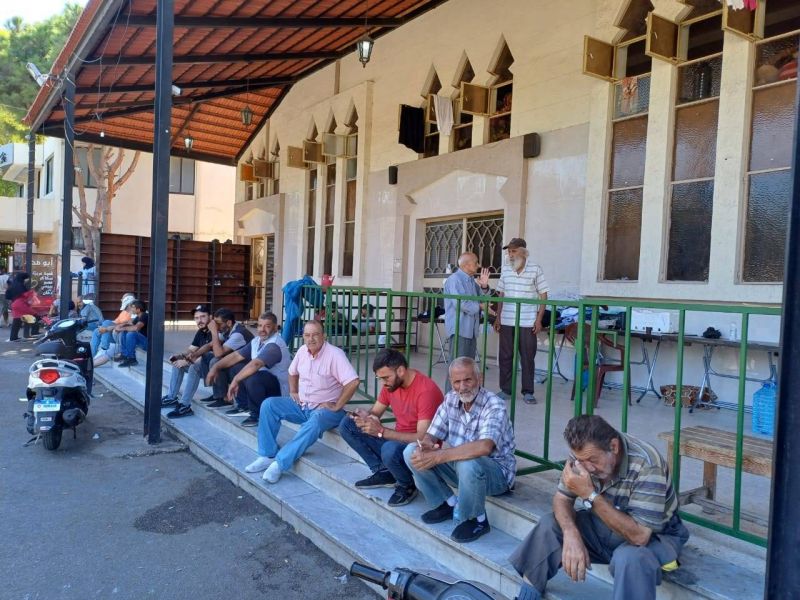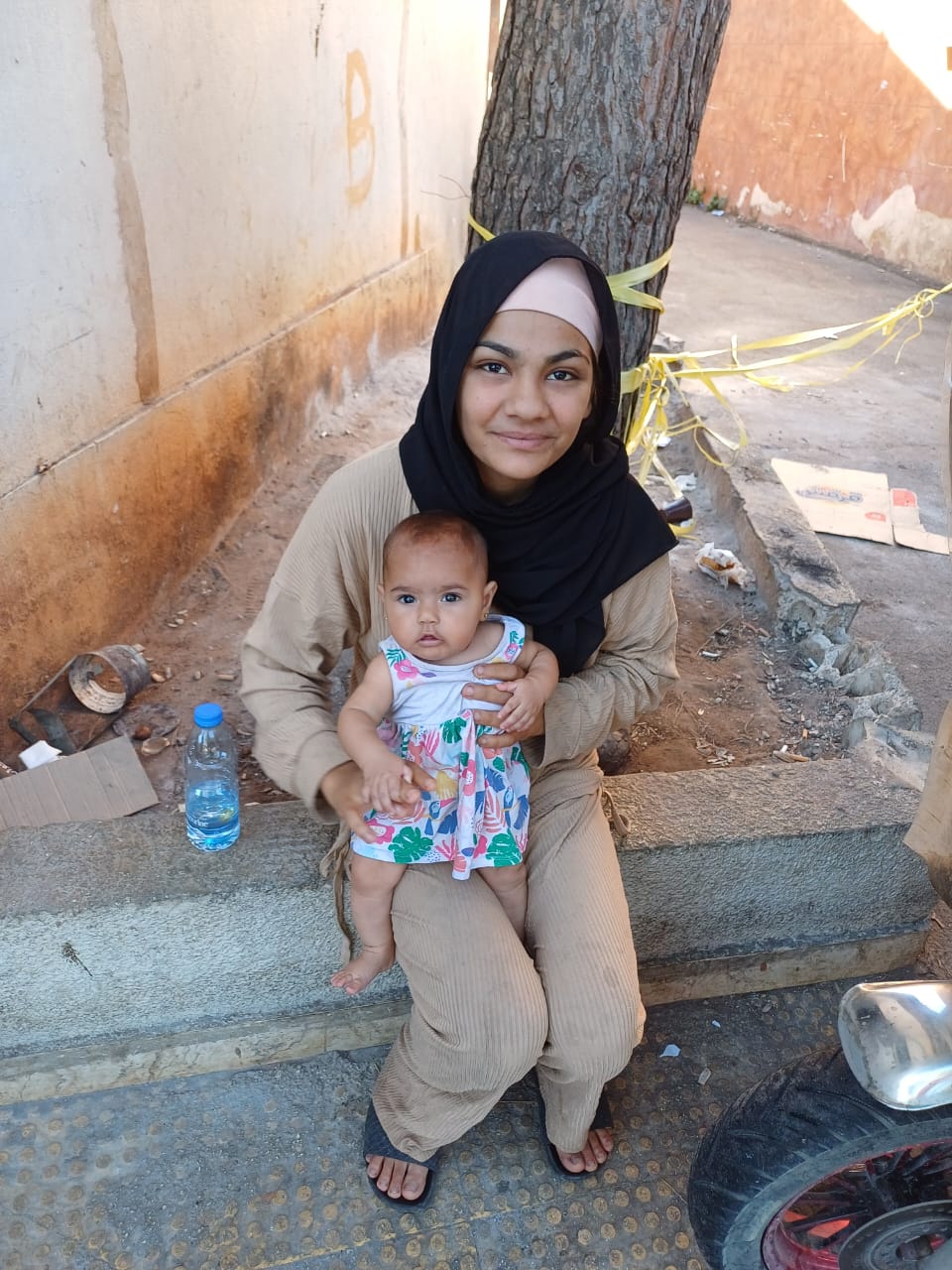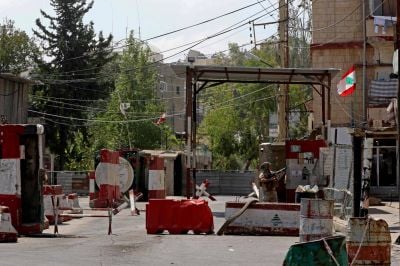
Displaced Ain al-Hilweh residents, who have taken refuge in the Al Mousalli mosque, are still waiting to return to their homes, September 15, 2023, Saida. (Photo credit Mountasser Abdallah/L'Orient-Today)
After a week of fighting, a sense of relative calm returned to the Ain al-Hilweh camp on Friday morning. The break from fighting can be attributed to a new ceasefire agreement reached Thursday evening.
Despite the apparent return to calm, the camp's displaced are not reassured.
'Who can guarantee that it won't escalate again?'
In the Al Mousalli mosque, just steps away from the camp, some 200 displaced people have taken shelter on site. They wait to see if the ceasefire will be respected this time.
"Who can guarantee that it won't escalate again? I will wait for a more official announcement that guarantees a return to calm before going back. I don't want to risk losing a family member for nothing," says Asraa, a mother who fled the Hattin neighborhood of the camp with her family.
A new ceasefire was brokered Thursday, following a day long meeting led by Speaker of Parliament, Nabih Berri. The call for calm has been relatively observed so far, except for a few rounds of gunfire and two rockets launched between Thursday night and Friday.
The clashes, which began last Thursday between the Fatah, close to Palestinian President Mahmoud Abbas, and Islamist groups, including Jund al-Sham and al-Shabab al-Moslem (Muslim Youth), have shaken Ain al-Hilweh and neighboring areas.
The clashes are part of a power struggle between the fighting factions, who are vying for dominance over the camp within a regional context of Saudi-Iranian détente and US attempts to bring Saudi Arabia closer to Israel.
 Rajaa, a Ain al-Hilweh resident, at the Al Mousalli mosque, holding her 5-month-old baby, September 15, 2023, Saida. (Photo credit : Mountasser Abdallah/L'Orient-Today)
Rajaa, a Ain al-Hilweh resident, at the Al Mousalli mosque, holding her 5-month-old baby, September 15, 2023, Saida. (Photo credit : Mountasser Abdallah/L'Orient-Today)
Despite the ongoing danger and precarious calm, some inhabitants, like Shaymaa Ali, ventured back home on Thursday night.
Ali described the scene as a battlefield: doors smashed, windows shattered, holes in the walls.
She collected a few belongings and left quickly, concerned about how her children would react upon seeing their home in such a state.
Ghada Abbas, 33, fled on the very first day of clashes, barefoot, without any luggage, and without her medications.
Rajaa, a 20-year-old mother of a 5 month-old baby, doesn't even know where to go after her house was destroyed in the clashes. "I was told that there's nothing left of my house in Hay al-Tiri. I have no roof anymore," she says.
'The clashes must stop'
On Friday morning, a delegation from Hamas held talks with Saida independent MP Oussama Saad, emphasizing the need to halt the fighting once and for all.
"The ceasefire must be respected, armed confrontations must cease, displaced people must be allowed to return to the camp, and schools must reopen," stated Moussa Abou Marzouk, a Hamas official dispatched to Beirut to try to calm the situation.
"We will continue working with our brothers from Hamas and other Palestinian factions to enforce the ceasefire in the camp," Oussama Saad noted.
"We must assist our Lebanese and Palestinian brothers in returning home and repairing the damage. We also need to clear fighters from schools so that students can resume their studies. Additionally, we must hand over the culprits to the Lebanese authorities," he added.
A Palestinian source contacted by L'Orient-Le Jour said the agreement reached between the warring Palestinian factions includes several conditions, such as the withdrawal of fighters stationed in UNRWA schools in the camp and the handover of the killers of Abou Ashraf al-Armoushi, a Fatah official killed in late July. The agreement also calls for the surrender of Abdel Rahman Farhoud, accused of assassinating an Islamist official.
In an interview published on Friday by the Lebanese Arabic-language newspaper Al Joumhouriya, Azzam al-Ahmad, a member of the Palestine Liberation Organization's Central Committee, also called for the culprits to be handed over to the authorities. "The murderers and Takfiris [a term referring to Islamist extremists] must be delivered," he stated.
"What's important is to continue respecting the ceasefire. I can guarantee that Fateh and the PLO are doing so... We don't want to harm the residents of the camp or the surrounding areas," Ahmad added.
The clashes in Ain al-Hilweh have resulted in at least 18 deaths and hundreds of injuries following a week of intense fighting. The director of Al-Hamshari Hospital, located 500 meters from the camp, said the hospital received 30 bodies of victims killed in the clashes between July 30 and Sept. 14. The hospital also treated 205 injured individuals.
Over 100 people remain hospitalized in various facilities throughout the city.
